












- Heart disease
- Anxiety
- High blood pressure
- Dementia
- Depression
- Diabetes



Social connection is essential to our health and well-being.*


Advisory: The Healing Effects of Social Connection
Connection plays a critical role in individual, community, and societal health. This advisory calls attention to that role and offers a framework for how we can all contribute to improving social connection.
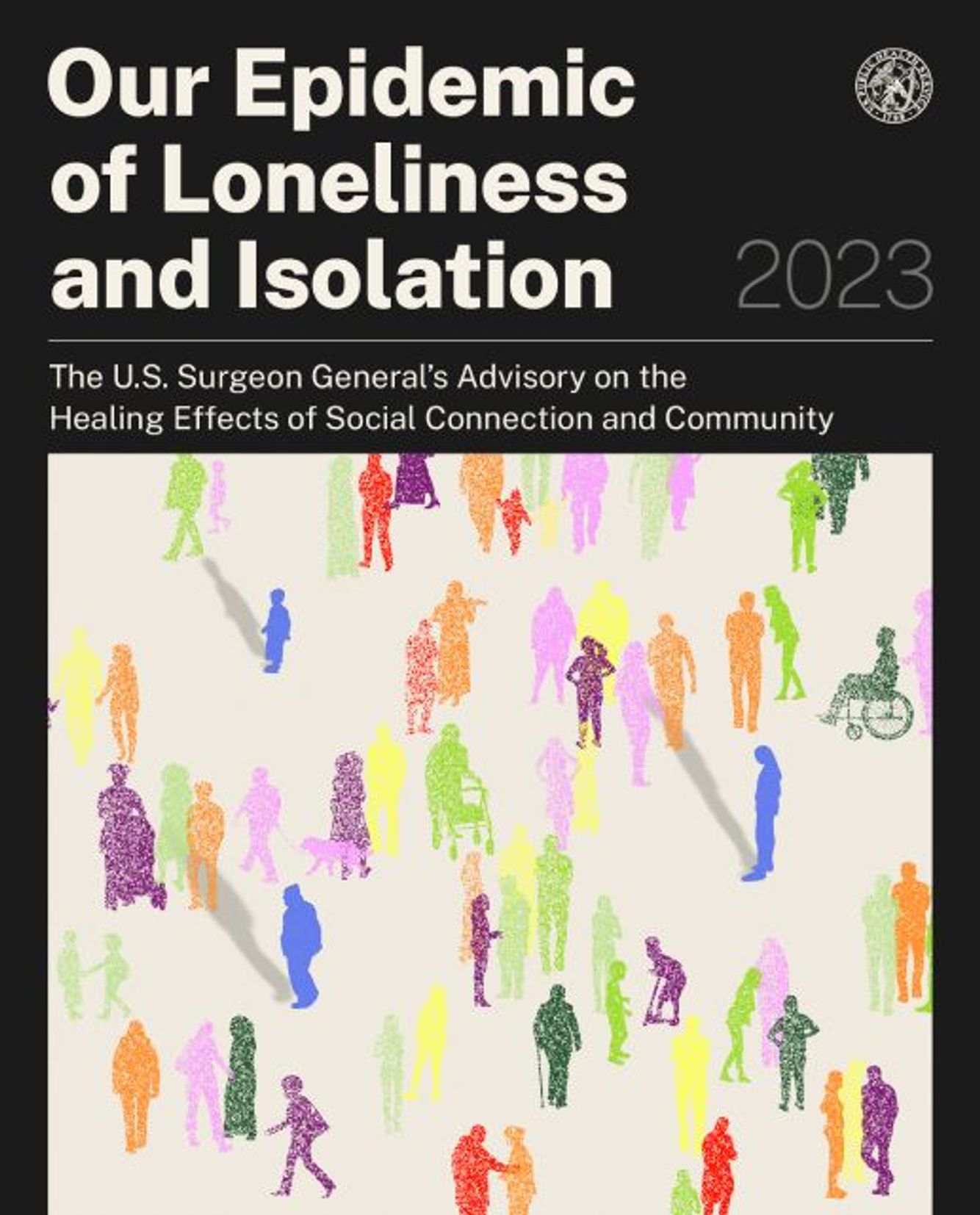
Key Takeaways from the
Share










Humans are wired for social connection, but we’ve become more isolated over time
Social connection is as essential to our long-term survival as food and water. But today, loneliness is more widespread than other major health issues in the U.S. Our epidemic of loneliness and isolation is a major public health concern.
Social connection significantly improves the health and well-being of all individuals
Social connection reduces the risk of premature mortality. It can predict better physical and mental health outcomes and ease stress. Higher levels of connection can influence health-related behaviors. Connection can even impact educational and economic achievement.
Social connection is vital to community health and success
Socially connected communities enjoy better population-level health. They are more prepared for—and resilient in the face—of disaster situations. They also experience greater economic prosperity and reduced levels of crime and violence.
Together, we can advance social connection and improve our nation’s public health
Fostering social connection requires that we each commit to our relationships and communities. Our actions today can create sustainable changes to society and bring better health to all.
Social Connection Fact Cards
Download Fact Cards [2.8 MB, PDF]Social Connection
Fact CardLiving in isolation reduces our chances of survival and social isolation increases the risk for premature mortality by 29%.1,2
Social Connection
Fact CardPoor social relationships, social isolation, and loneliness can increase your risk of heart disease by 29% and risk of stroke by 32%.1
Social Connection
Fact CardSmaller social network size is associated with an increased risk of type 2 diabetes and of other diabetic complications including heart attacks and kidney disease.1,2
Social Connection
Fact CardAmong older adults, chronic loneliness and social isolation can increase the risk of developing dementia by approximately 50%.1
Social Connection
Fact CardBeing more socially connected can improve stress responses and minimize the negative health effects of stress.1,2
Social Connection
Fact CardPeople with strong perceptions of community belongingness are 2.6 times more likely to report good or excellent health than people with a low sense of belongingness.1
Social Connection
Fact CardChildren and adolescents who enjoy positive relationships with their peers, parents, and teachers experience improved academic outcomes.1
Social Connection
Fact CardSocial isolation, or even the perception of isolation, can increase inflammation in the body to the same degree as physical inactivity.1
Social Connection
Fact CardAdults who report feeling lonely often are more than twice as likely to develop depression as adults who report rarely or never feeling lonely.1
Social Connection
Fact CardSocial support from friends and family is associated with improved hypertension and diabetes management.1,2,3,4
Social Connection
Fact CardImmersion in local community-based activities such as volunteering significantly increases the likelihood of unemployed individuals becoming employed.1,2,3
Social Connection
Fact CardLoneliness and poor social support have been found to significantly contribute to the development and severity of illnesses after exposure to viruses.1,2
How Can We Take Action Together?
How do we put this important information to practical use in our society? The Surgeon General has created a Framework for a National Strategy to Advance Social Connection. This details the critical and actionable next steps that individuals, communities, organizations, and governments can take to foster social connection.
We all have a role to play in fostering social connection. Click on your role below to view recommendations and resources in our Resources Library.

Spread the word with these shareable tools
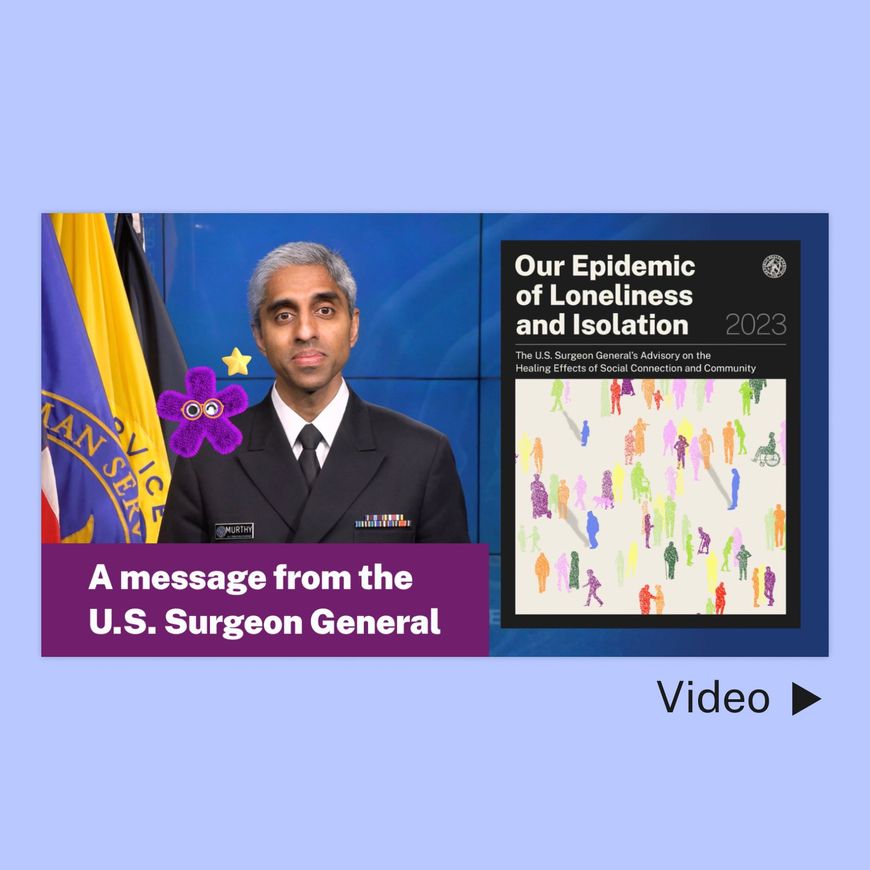 U.S. Surgeon General Dr. Vivek Murthy addresses our nation's loneliness & isolation crisis and the healing effects of social connection.Watch video
U.S. Surgeon General Dr. Vivek Murthy addresses our nation's loneliness & isolation crisis and the healing effects of social connection.Watch video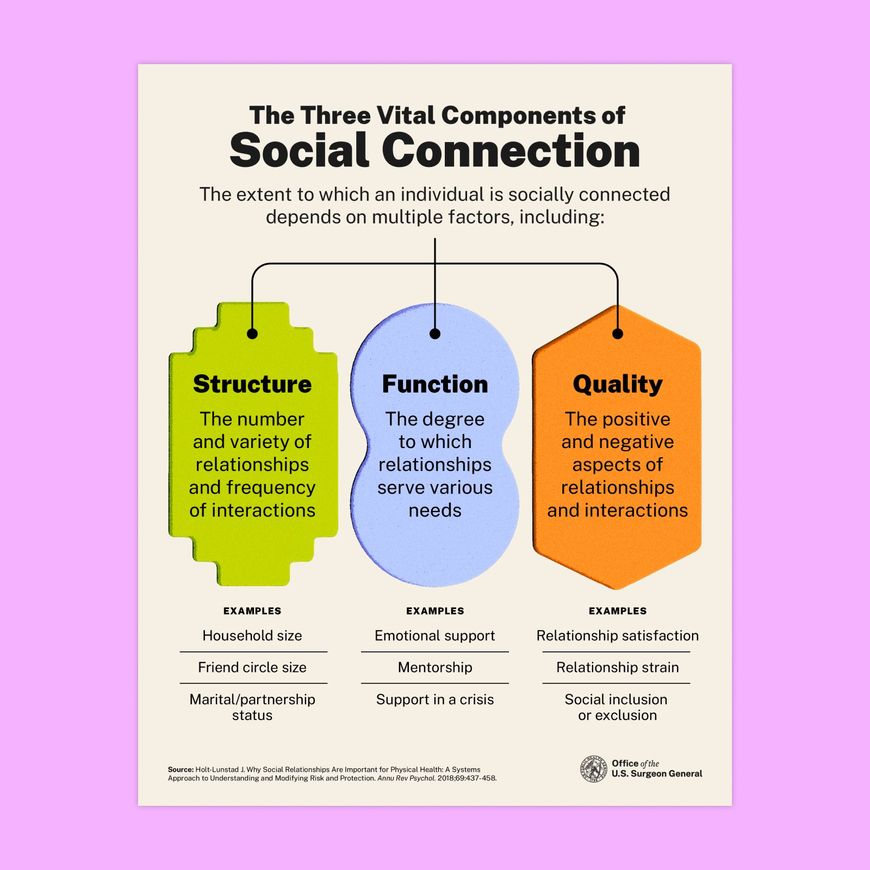 This graphic explains relationship factors that contribute to an individual’s social connection.Download [PDF, 4.1 MB]
This graphic explains relationship factors that contribute to an individual’s social connection.Download [PDF, 4.1 MB]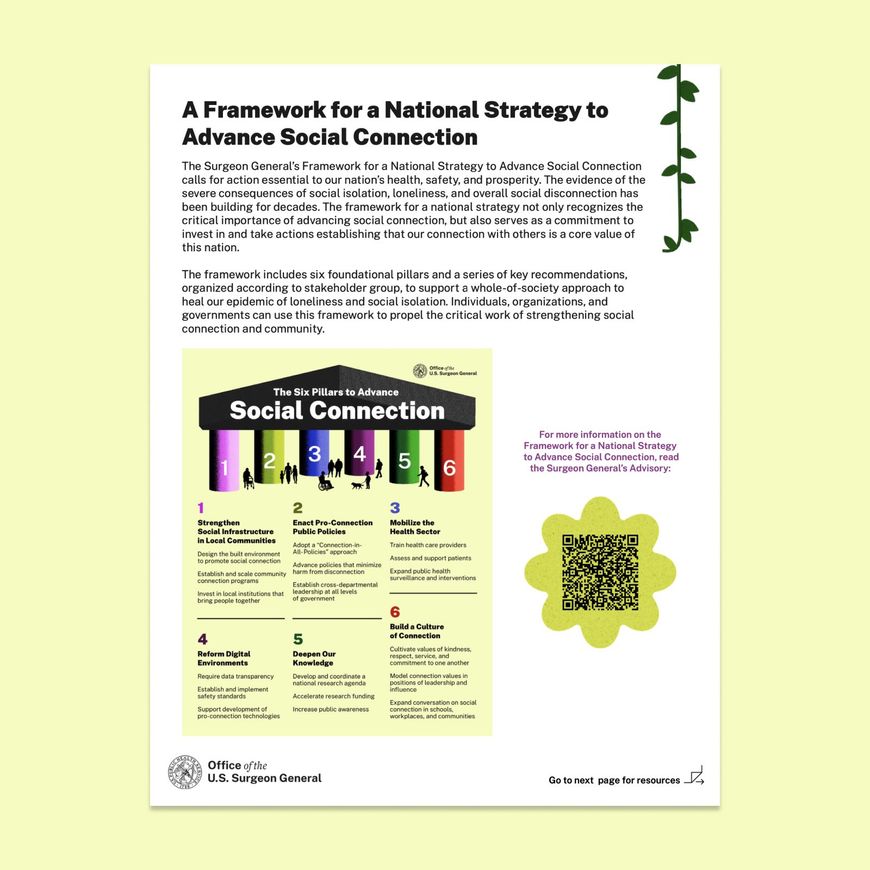 This document includes information about the National Strategy to Advance Social Connection and recommendations for key stakeholders to foster greater social connection.Download [PDF, 1.7 MB]
This document includes information about the National Strategy to Advance Social Connection and recommendations for key stakeholders to foster greater social connection.Download [PDF, 1.7 MB]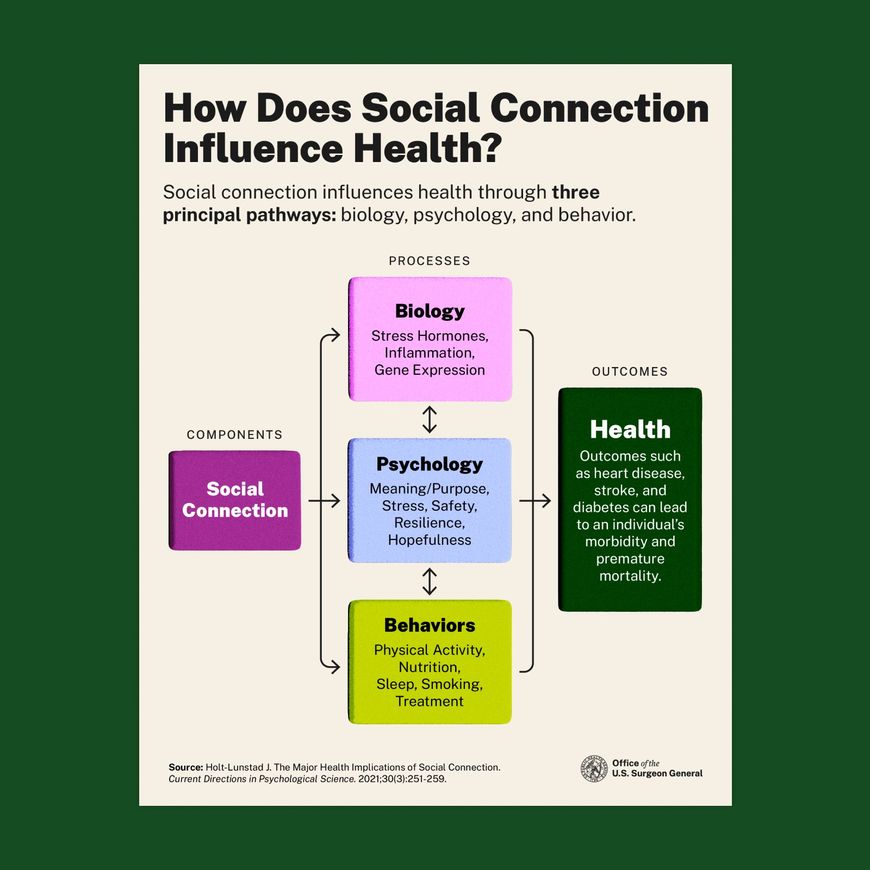 This graphic communicates the three pathways through which social connection has an impact on overall health.Download [PDF, 4.6 MB]
This graphic communicates the three pathways through which social connection has an impact on overall health.Download [PDF, 4.6 MB]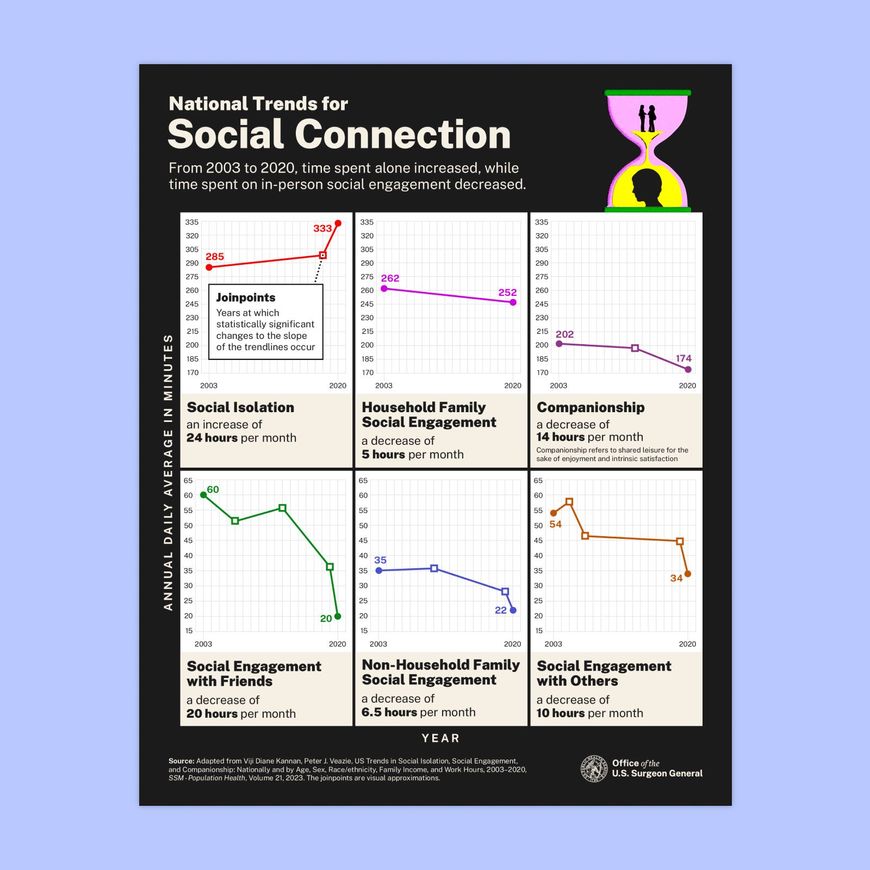 This graphic shows national trends in social isolation and social connection behaviors from 2003 to 2020.Download [PDF, 3.7 MB]
This graphic shows national trends in social isolation and social connection behaviors from 2003 to 2020.Download [PDF, 3.7 MB]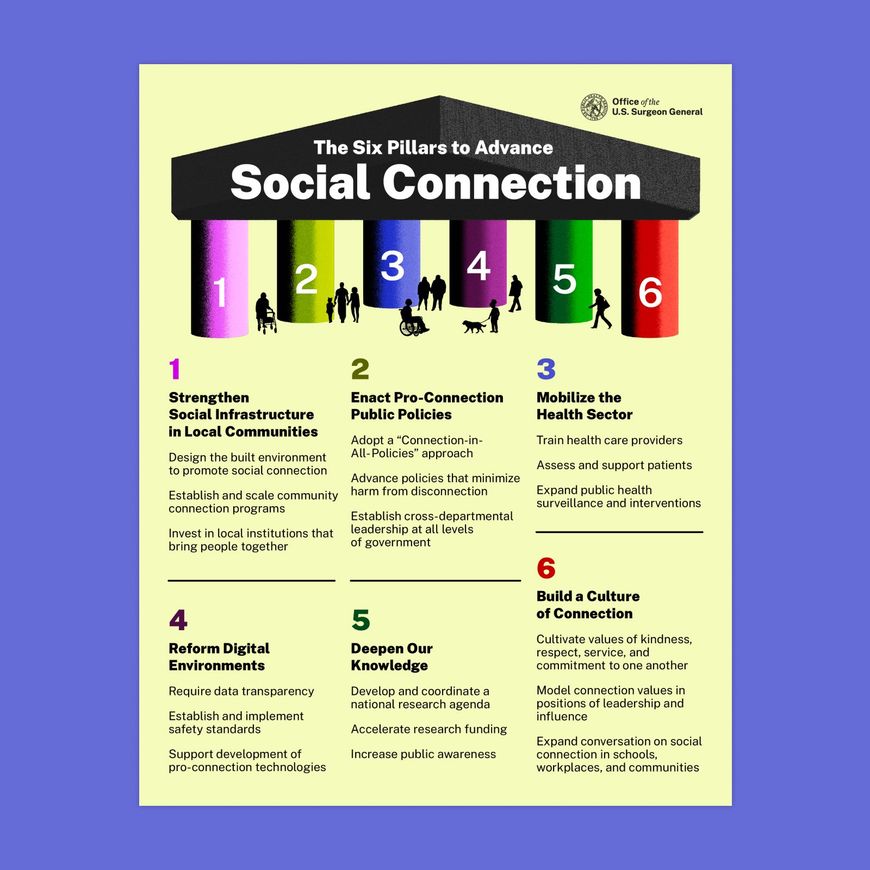 This graphic communicates the Surgeon General’s Framework for a National Strategy to Advance Social Connection.Download [PDF, 3.3 MB]
This graphic communicates the Surgeon General’s Framework for a National Strategy to Advance Social Connection.Download [PDF, 3.3 MB]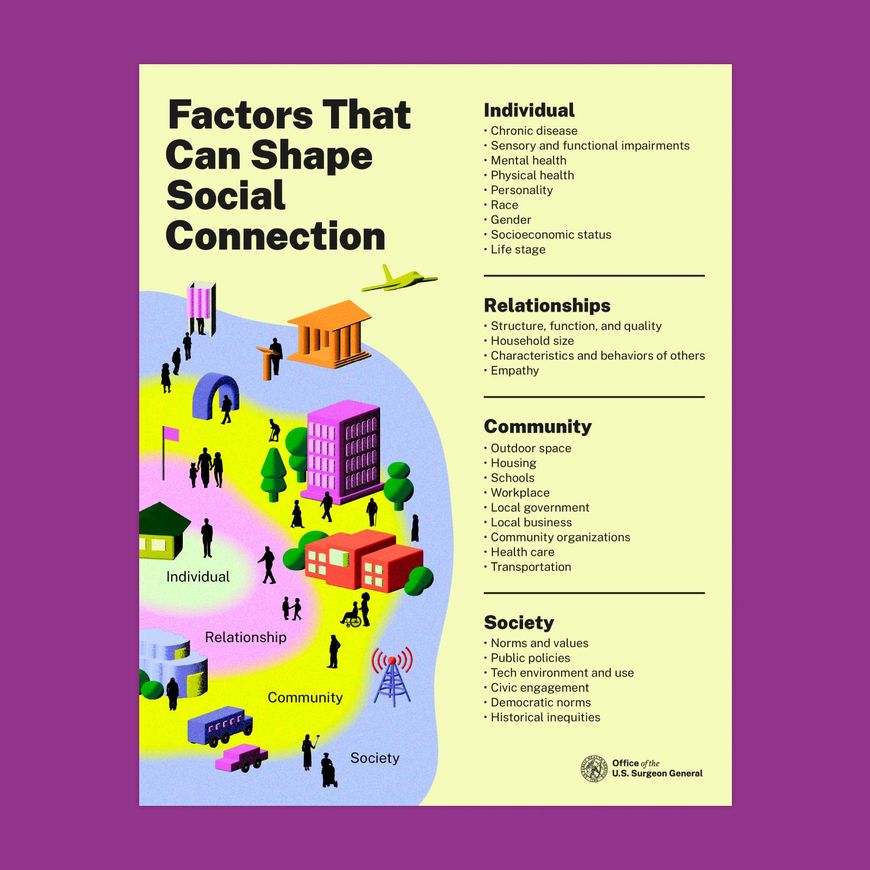 This graphic communicates the factors—from individual to societal—that play a role in shaping social connection.Download [PDF, 11 MB]
This graphic communicates the factors—from individual to societal—that play a role in shaping social connection.Download [PDF, 11 MB]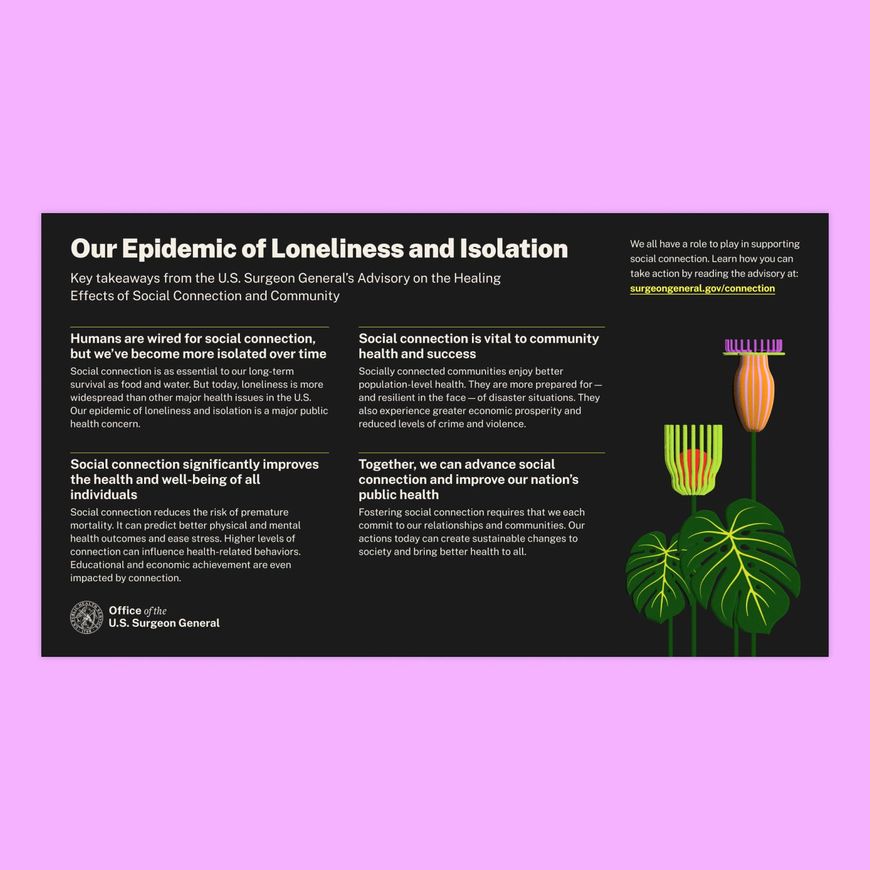 This slide includes the key takeaways from the advisory.Download [PDF, 6.8 MB]
This slide includes the key takeaways from the advisory.Download [PDF, 6.8 MB]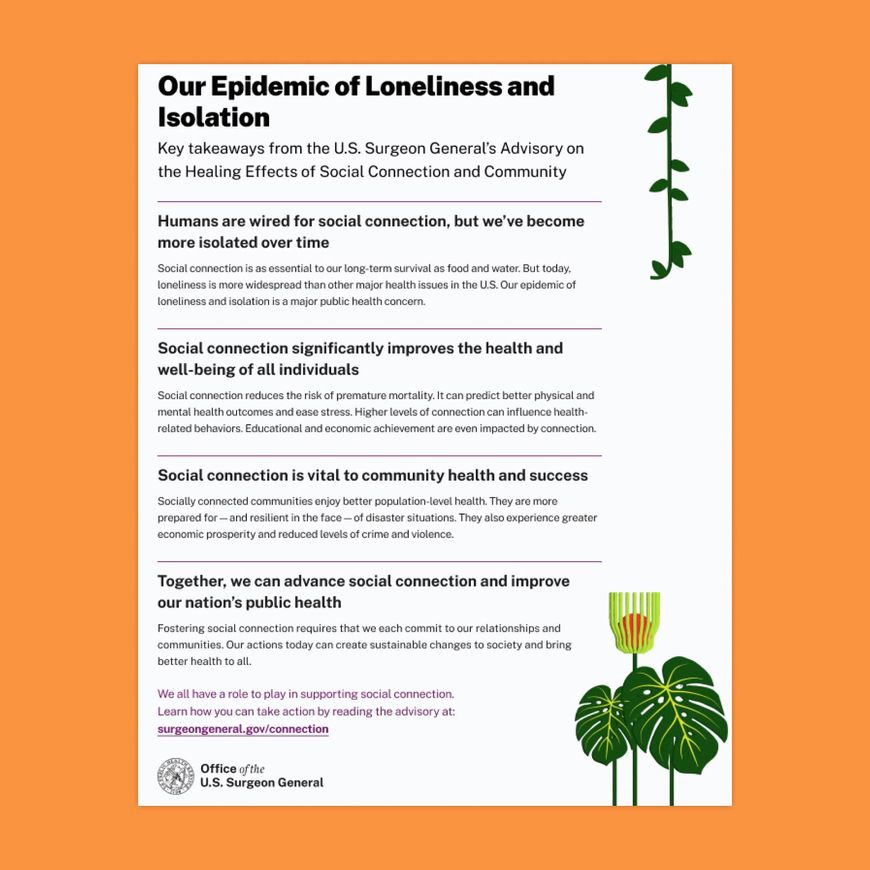 This document includes the key takeaways from the advisory.Download [PDF, 4.9 MB]
This document includes the key takeaways from the advisory.Download [PDF, 4.9 MB]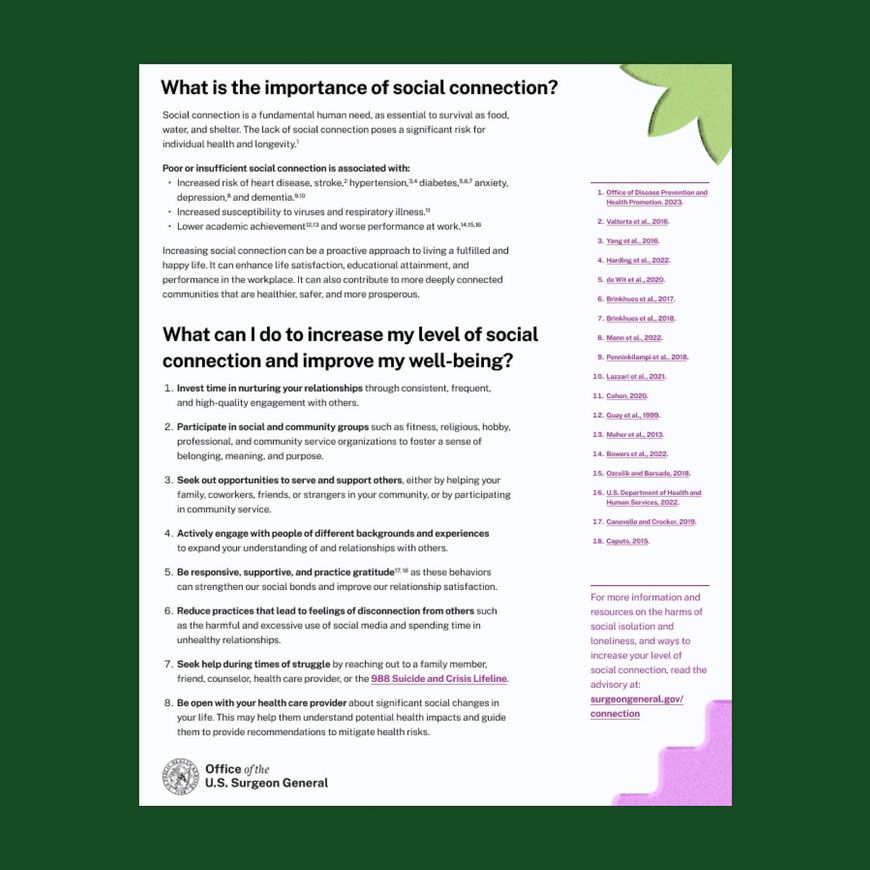 This one-page document includes information and recommendations for an individual to foster greater social connection in their life.Download [PDF, 2.1 MB]
This one-page document includes information and recommendations for an individual to foster greater social connection in their life.Download [PDF, 2.1 MB]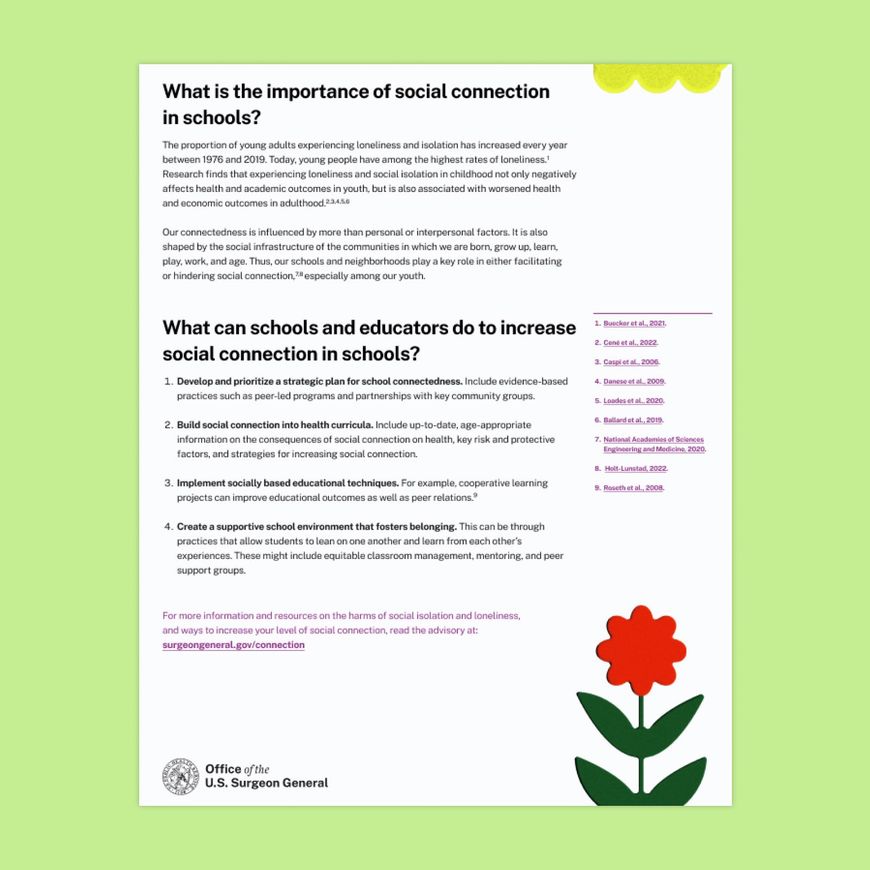 This one-page document includes information and recommendations for educators and administrators to foster greater social connection in schools.Download [PDF, 6 MB]
This one-page document includes information and recommendations for educators and administrators to foster greater social connection in schools.Download [PDF, 6 MB]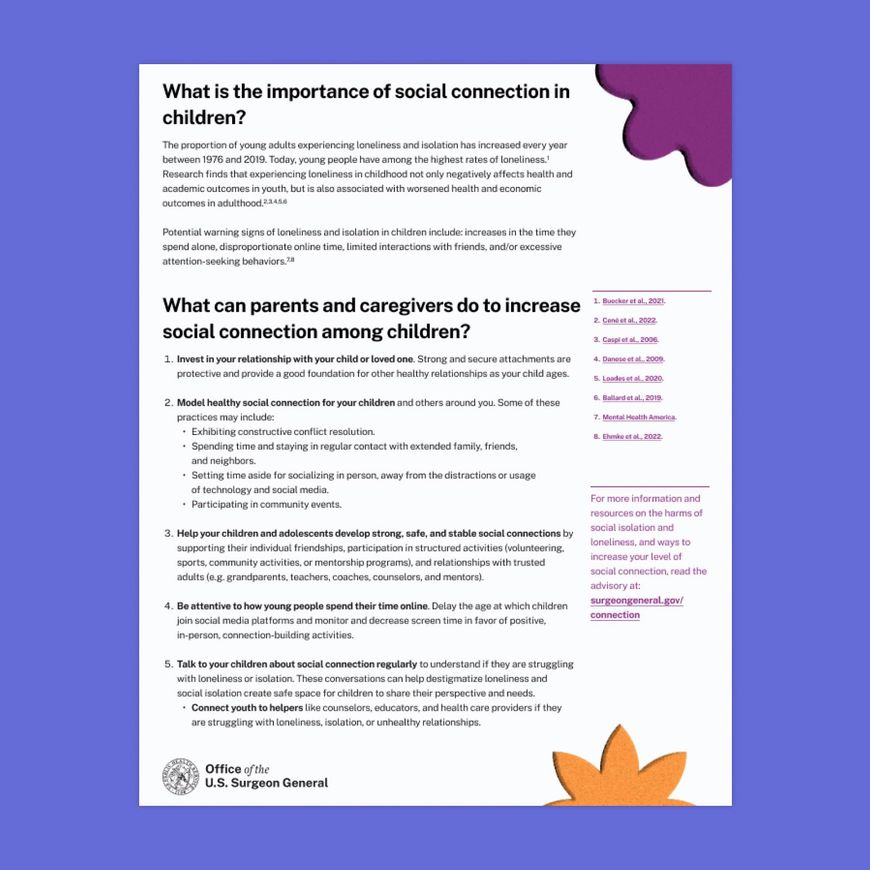 This one-page document includes information and recommendations for parents and caregivers to foster greater social connection in their children’s lives.Download [PDF, 2.1 MB]
This one-page document includes information and recommendations for parents and caregivers to foster greater social connection in their children’s lives.Download [PDF, 2.1 MB]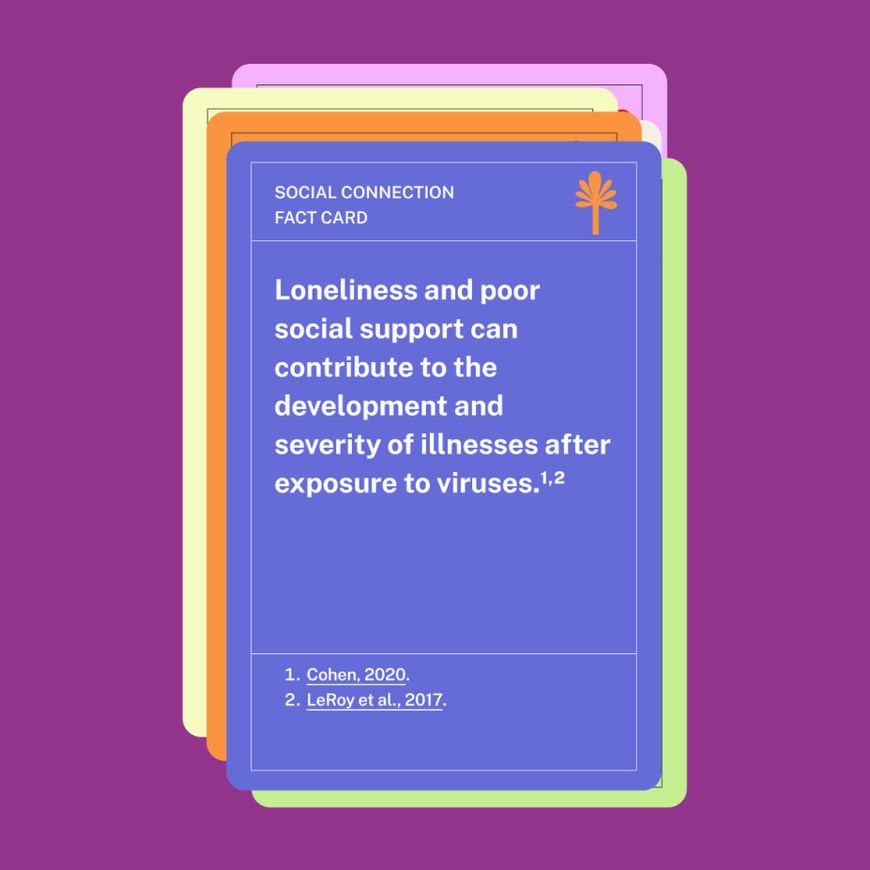 This PDF includes 12 social connection fact cards that highlight the negative impact that social isolation and loneliness has on individual and community level health and well-being.Download [PDF, 2.8 MB]
This PDF includes 12 social connection fact cards that highlight the negative impact that social isolation and loneliness has on individual and community level health and well-being.Download [PDF, 2.8 MB]